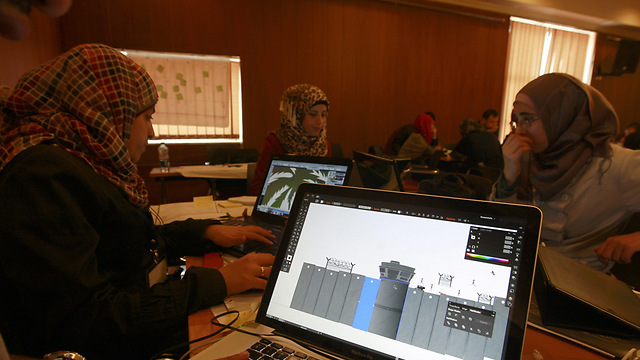
Peace is good for economics
For over 20 years, Israel and Palestinians struggle to imagine how peace would look like. A group of researches made it their project to paint an accurate picture of life after a peace deal, and discovered: Peace is good business for Israel, PA and Jordan
Thus the S. Daniel Abraham Center for Strategic Dialogue at the Netanya Academic College decided, in partnership with the EU's Partnership for Peace program, to bring together a group of experts from Jordan, the Palestinian Authority and Israel, to conduct research into the ramifications the establishment of a Palestinian state would have on security, politics and the normalization and economies of all three states. They were also asked to investigate the influence such an event would have on the Palestinian diaspora.
Recently, their study was published in three in languages and presented to decision makers in Israel, the PA, Jordan and in the US, including State Department officials.
It turned out that even as a thought experiment the researchers had a hard time imagining a stable and sustainable regional peace. But on two issues, the team managed to find simple yet definitive answers.
The first, surprisingly, was security. It turns out the retired generals, especially those from Jordan and Israel, could easily imagining wide scale defense cooperation which would aid both sides. They discovered that once the sides agreed to cooperate, it became clear to all of them that the enemies of Israel are also the enemies of those willing to sign a peace deal with Israel, and hence it was in the mutual interest of all the sides to supply mutual security guarantees to one another.
What about Palestinian programmers
The second issue which the researchers reached agreement over was economics. Economists are used to thinking about the way commerce can improve conditions for both sides, and thus it was easy for them to see how trade between Israel, the PA and Jordan could better life for those involved. Everyone knows that Palestinians who are employed in Israel, even in manual labor, make two or three times more than those employed within the PA. Meanwhile, their Israeli employers pay Palestinians only 60-70 percent of what they would have paid an Israeli for the same job, while also avoiding the red tape involved in importing foreign workers from abroad.

Palestinian high-tech students (Photo: AP)
In the field of agriculture, both Israeli consumers and Palestinian farmers have much to gain from cooperation, the experts found. Next year, for example, will be a fallow year (shnat shmita), a year in which there is a drastic drop in the agricultural output in Israel, causing prices to rise. If Israel and the Palestinians would succeed in fostering closer and more efficient cooperation surrounding water usage, it would be possible to establish additional water purification stations in the West Bank and thus triple the amount of tilled land available for farming. For the Israeli consumer, this would mitigate the inevitable rise in food prices, while the Palestinian farmer would almost double his profits.
Even the high-tech sector could profit from greater cooperation. In Jordan, the king personally works to promote high-tech ventures. In the PA, the percentage of high-tech products has risen from almost zero to now just shy of six percent of the PA's gross product in less than four years time. Nonetheless, in both Jordan and the PA, a large majority of technology students fail to find work in the field.
If an Israeli high-tech company would transfer a portion of their outsourcing from India to the PA or Jordan, they would easily find qualified workers who are fluent in English only a short drive away and at competitive prices. More so: Over the next two years, Israeli companies who employ Palestinians and Jordanians will enjoy benefits from US and EU subsidies, thus the price of establishing a training center for such workers are reduced to almost nothing.
Paining the full picture
Cooperation between Israel and the PA would also increase tourism to Israel. Today, the tourism industry is shrinking to only a percent of the gross product, so that no new hotels are being established and old ones are on the brink of bankruptcy. Cooperating with the Palestinians would better Israel's standing in the world, and the resulting rise in tourism would create work for thousands in the periphery. The profit, the experts predicted, would stand at roughly NIS 12 annual.
It is clear, not only to experts, that peace is quite lucrative, at least for those who want to make a living and not live off their sword. We must be paint this picture for our Israeli and Palestinians, struggling to image what peace would or could look like.
But this picture does not near the level of cooperation enjoyed by Canada and the US – which share the longest unmanned border in the world – but in our stormy Middle East, it serves to spark our imagination regarding how peace can look like. And maybe to move forward towards the "political horizon", we need an occasional glimpse of life beyond that horizon and at the promises it entails.
Dr. Avihai Snir is a lecture at the Netanya Academic College and was a member of the team of experts focusing on economy, he is a senior economist at the Infinity Investment Firm.
Eli Freidman is head of the S. Daniel Abraham Center for Strategic Dialogue at the Netanya Academic College.










